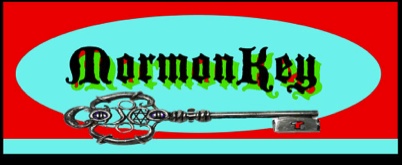ELDER JOSEPH R. LAMBERT FAITH'S KEEPER OF THE TRUTH
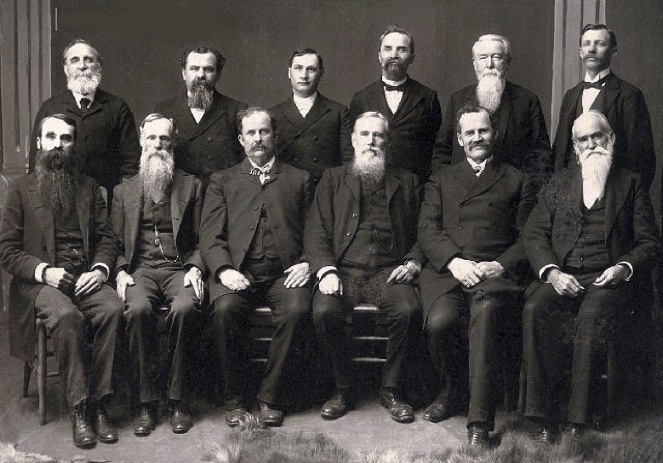
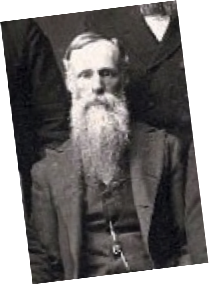
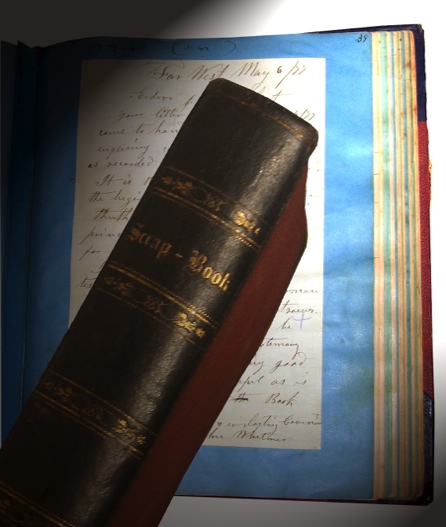
I am the second child of Richard and Jane LAMBERT, born in Rock Creek Township, Hancock County, Illinois, October 4, 1845. The place of my birth is located about nine or ten miles southeast of the celebrated city of Nauvoo.
My parents were born in England, received the gospel there, and because of their faith and hope, came to America - father in 1840, at the age of eighteen, mother in 1841, at the age of sixteen. They were married on April 10, 1843. As a result of this union fifteen children were born unto them, twelve of whom are yet living, six boys and six girls.
My parents uniformly testified that there was much corruption in the church at Nauvoo, but that "exposers of Mormonism," so called, misrepresent and falsify the events of those times, rendering their works unreliable. I have also heard them say, at different times, and to different persons, that while at Nauvoo, they perceived a soundness and spirituality connected with the preaching of Joseph Smith, the Seer, that did not characterize the preaching of Brigham Young, Heber C. Kimball, and others. However they claimed (especially mother) that Young, Kimball, Hyde, and Fielding, were humble, God-fearing men when they did their first missionary work in England.
I was a puny, frail child, and mother was frequently told that she could never raise me.
My parents did not follow the fortunes of Brigham Young and company; they were permitted to remain at their humble home without any compromise with the enemies of the Saints. Having had their confidence greatly shaken in those whom they had trusted as servants of God, they gradually drifted into the world. The result of this was that, we older children were not taught religion in any form (as religion is usually understood), neither by precept nor example. We were, however, taught to be honest, just, truthful, industrious, etc.
As I grew up, I became skeptical about the Christian religion; though in my reflective and meditative moods, I always reached this conclusion: "There is a God, or Supreme Being; it is probable that there is a future state; and it may be that we are responsible to God for our deeds in this life ."
When I heard the elders of the Reorganized Church of Jesus Christ of Latter Day Saints, in 1860, and afterwards, it was a new light to me. I began to believe at once, though it was some time before the necessity of obedience came to me with the force of a strong conviction, which occurred under the preaching of Elder John A. McIntosh, of Shelby County, Iowa. After some investigation, thought, and earnest prayer, I was baptized at Nauvoo, Illinois, November 5, 1863, by Elder James Burgess.
Was ordained to the office of teacher December 8, 1866, Z. H. Gurley, Sr., being spokesman. Held this office for more than four years. I then thought, "Right here, in this office, is my life work. If I can fill it as it should be filled, I will have great reason to be thankful." It did not seem possible that I could ever fill a higher office; and I was then, as I am now, afraid of a spirit of ambition and aspiration.
A portion of the years 1868 and 1869 found me unfaithful in my office and membership, but with no thought of abandoning the work. The Rock Creek Branch, of which I was a member, had almost gone to pieces. No meetings were being held, and there was general dissatisfaction with the presiding elder; not as a man, but with his official work.
My brother, D. F. LAMBERT, nearly five years younger than I, had obeyed the gospel in 1864; and although but thirteen years of age, he was very faithful, and soon became a leading worker in the branch. When I was the most careless and worldly, he seemed to be the most faithful and prayerful, and this had much to do with bringing me to realize that it was foolish and wrong for me to fritter away precious opportunities, or suffer myself to partake of the spirit of the world.
When fully awakened to my condition, I discovered what I had lost, and that I would have to work hard and long to regain it.
In the summer of 1869, while at work in the field, I was strongly impressed by the Holy Spirit to go and see the president of the branch, and if possible, get him to appoint a meeting in order to see what could be done to revive the branch. It was a success. I went at exactly the right time. The branch was soon in running order again, though some of us had to bear the grave charge of having a wicked ambition to lead, before this desirable condition was reached. However, the old brother who made this charge (against my brother and me, in particular), lived to see and acknowledge his wrong; and his confidence in us, from that time to the day of his death, was unwavering.
In the fall of 1869 I was strongly impressed to take all I had saved from my earnings since I reached my majority and go to school at Ft. Madison (Iowa) Academy.
I had no definite object in this, except to acquire more education; but go to school I must, or sin against my own conscience. My age was twenty-four, but my education was very limited indeed.
I attended school about thirteen months, in 1869 and 1870.
On January 26, 1870, I was ordained to the office of priest, by Bro. Henry F. Pitt. I held this office but for a little while. It was revealed to me, as I thought, that I was about to be called to the eldership; but although I was very intimate with my brother, before referred to, I did not even tell him anything about it. I reasoned like this: "If the Lord has revealed this, he will take care of it without any effort on my part, except prayer and right living; and if he is not the author of this revelation, I do not want to be ordained as a result of it."
It was brought about in a couple of months or so, in a way that was satisfactory to all concerned, so far as I know, and on the 4th day of September, 1870, at a district conference, held at Keokuk, Iowa, I was ordained an elder by Bro. John H. Lake.
It seems that I was now to learn more fully than I had ever learned before, that every advance step taken would be disputed and stubbornly opposed by the invisible powers of darkness. In a short time after my ordination, I attempted to preach, but failed. From time to time I tried it again, until I had failed five or six times in succession. What was I to do? I felt sure that I had been properly called and ordained; and when studying the word, I enjoyed a degree of light; but scarcely would I be on my feet to speak before the power of an opposing enemy was felt. It would gradually increase until I felt compelled to sink back into my seat. I remained quiet for some time, waiting, and watching, and praying for another opportunity to overcome. For the time being, I was overcome, but not vanquished.
About this time, or soon after, Mr. A. W. Head, then an outsider, and quite skeptical concerning some of our claims, entered into conversation with Bro. H. F. Pitt. Bro. Pitt contended that the faithful preacher is helped by the Holy Spirit in the preaching of the word. Mr. Head denied; and in order to emphasize his position, he said substantially the following:
"Now, there is Dan LAMBERT, he can preach, because he is smart; but there is Joe who will never make a preacher as long as the world lasts!"
Sometime after this, while I was talking about the gospel, in the Lincoln Schoolhouse, Mr. Head was one of the congregation. I enjoyed liberty, and while speaking, I noticed the tears trickling down his face. At the close of the service he asked for baptism, and I baptized him. He is now an elder, living at Stewartsville, Missouri. He works and prays for the advancement of the cause, and loves to depend upon God for the help of the divine Spirit.
In the summer of 1871 I taught a short term of school at the Lincoln Schoolhouse, in Rock Creek Township, Hancock County, Illinois. In the summer of 1872, I taught again at the same place. I liked teaching, and concluded to make it my life work.
In the fall of 1872, my brother Daniel and I were canvassing for "Bunyan's Complete Works," in one volume. Some distance from where I had taught school, I was urged to accept a six months term at forty-five dollars per month. I needed the money badly, and I liked to teach, but still I hesitated to accept the offer, thinking it might be my duty to spend the winter in preaching in the district, after I had earned my clothes. I delayed my final conclusion for several days, meanwhile making it a subject of earnest prayer. I had to decide to spend the winter in ministerial labor in order to do justice to my conscience, though I must confess that, for a time, it was somewhat of a trial to me. I had felt the sting of poverty, and now I desired to do something for myself financially.
My brother Daniel and I launched out on our first missionary voyage, on January 7, 1873, and returned home on February 26. We preached and labored at Burlington, Montrose, and Keokuk, Iowa, and at different places in the vicinity of Elvaston and Burnside, Illinois. We met with the usual opposition from without, and discouragements from within; but made many friends to ourselves and the cause. We were blessed and tried, and, through the goodness of God, were successful in our labors.
We were inexperienced, plainly clad farmer boys, neither of us possessing any such ornamental luxury as a white shirt. We furnished our own clothes, and when car fare was not furnished, we walked.
The closing portion of the winter of 1873 was spent in manual labor, making my home at father's and preaching at various places as my circumstances would permit. At this time I was squarely confronted with another grave question: "Is it my duty to spend my whole time in the ministry, or shall I support myself, and labor as my circumstances permit?" Almost daily I presented this question to God in prayer. My experience was very strange to me.
When I mentioned the matter to the Lord, he quickly responded by the peace and blessing of the Holy Spirit, but nothing was revealed, by impression or otherwise. I marveled at this, but finally concluded that the bestowment of the Spirit simply meant that God was pleased with the asking, but it was not his will that I should spend my whole time in the ministry. So I made arrangements to earn my clothes (and I hoped something more) during the hot months of summer, and spend my time preaching in the winter.
In March, I attended the district conference at Montrose, Iowa. A car was chartered for the purpose of attending the General Conference, to be held at Plano, Illinois, in April; and as I had never been there and the round trip only cost five dollars, I concluded to go. At this time President Joseph Smith was residing at Plano, editing the Saints' Herald or what was then entitled The True Latter Day Saints' Herald.
The conference at Plano, convened on Sunday. On Tuesday I was asked by Bro. John H. Lake, who had been deputized by the First Quorum of Seventy (of which he was then a member), if I would accept ordination and membership in the Quorum of Seventy. I replied that I would try to furnish him with a definite answer on the morrow, but could not see that I could accomplish more as a seventy than an elder, unless I had evidence that God wanted me to occupy in that position. To this Bro. Lake responded:
"That is right; but the quorum desired me to speak to you and see how you felt about it."
At my first opportunity I presented the matter to the Lord in secret prayer, when all at once I was fairly enveloped with the Spirit, but not a thing was revealed; so I concluded to say "no, I can not accept."
On Wednesday morning the revelation was read, in which myself, with a number of others, were called into the Quorum of Twelve. This revelation was given on March 3, 1873, and in all the late editions of the Doctrine and Covenants is section 117.
All was plain now. The law defining the duties of an apostle in the Quorum of Twelve, showed that it was my duty to give my life to the work of the ministry. God does not do that which is superfluous. He gave me his Spirit when I prayed, took me to conference, gave me a testimony of the divinity of the revelation before my name was read, but kept me waiting till the revelation was read for a complete answer to my prayer.
Many rejoiced; but while I felt glad to be thus acknowledged of God, I never before had felt so little and so solemn. Indeed, the weight of responsibility, as I felt it then, burdened me heavily, and produced a strong tinge of sadness in my soul.
On April 10 the men named in the revelation for various positions were ordained. In my very brief diary for that date, I find the following jotted down in shorthand:
"After some little business was transacted, the ordinations were attended to. It was truly a solemn time. Men of humility, desiring no position, and willing to work wherever placed, called by the great God to fill such high positions! I never felt so solemn in all my life."
Bro. Joseph Smith was spokesman when I was ordained; and after going through the formula of ordination in a very impressive manner, he enjoyed the gift of prophecy. I remember distinctly much of what he said, and a portion of it I recorded in my diary, at the time. He spoke about as follows:
"Joseph, as you have gone forth and made many friends, both for yourself and the cause, so, if faithful, you will continue to do. But not all above your head shall be sunshine. Dark and heavy clouds shall draw near and threaten your destruction."
The following I take from my diary:
"As thy heart's desire has been to do good, thou shalt become a workman that needeth not to be ashamed. The blessing of the Almighty, and his counsel, shall be thine. Be not fearful, although thou shalt not always walk in sunshine, and thy feet shall almost go down; but thy God shall keep thee. There are influences at work which may harm thee, but if thou art faithful, thou shalt be kept."
At this conference I was appointed to labor in Iowa, Illinois, and Missouri.
There is one paragraph in the revelation which called us to office which has ever been (to me) both instructive and encouraging. Instructive, because it enjoins a straightforward, humble, and constant effort to be faithful in the office to which we were called. Encouraging, because of the precious promise made. It reads as follows:
"Verily, I say unto you, if these my servants will henceforth magnify their calling in honor before me, they shall become men of power and excellent wisdom in the assemblies of my people."
On December 11, 1873, I was united in marriage with Mrs. Anna E. PHELPS. Her maiden name was CHAMBERS, she, at the time of our marriage, being a widow with one child. Her parents were what is called "Pennsylvania Dutch," and were members of the Dunkard Church. I had baptized Mrs. PHELPS in May, but was very slightly acquainted with her at the time.
When, in the month of June, I felt that my affections were being drawn out towards this woman, I resisted it with all the power at my command, but was not successful. I began to pray earnestly that I might overcome what I then regarded as simply a weakness. Why should I marry, having neither money, property, nor good health? And even if I should think to marry, I had no reason to believe that this woman desired to marry any one, much less me.
I continued to pray, but felt humiliated and alarmed at my failure to overcome my feelings. One day, while struggling in prayer, in the woods, near to the home of Bro. William Wallace (about twelve miles south of where I was born), asking only for power to overcome, all at once, the Spirit said to me:
"She is thy companion and wife."
For a few moments I was unable to stand on my feet. I rejoiced and wept, and yet I was not fully what God wished me to be. I loved the woman with a pure love; God had spoken to me, and yet there was a degree of pride in my heart. I had felt from the time I merged into manhood, that if I ever married, I would not marry a widow. I had even said so to a few. It seemed to me to be a very improper thing for a young man who had never been married to do. So I determined to go slow and not be deceived, even by revelation. I returned home without saying anything to Mrs. PHELPS.
My health was giving way. I had a very bad spell of sickness in the fall of 1872, and by many my life was despaired of. This sickness left me in a worse physical condition than I had been in before, and after my return from Bear Creek, where Mrs. PHELPS lived, I gradually grew worse and felt much discouraged. One day, after some serious meditation, the reproof of God's Spirit suddenly took hold of me and said:
"If you do not act promptly in this matter, you will be left under condemnation and will lose a precious blessing." I said in my heart, "I will act at once." And although nearly down sick, I asked for pen and paper, and wrote a letter to Mrs. PHELPS at once. I found no difficulty in wording my letter in a suitable manner, but of course I did not hint at or mention my experience.
In a few days I was better, and I started off in a different direction from Bear Creek, and away from the post-office. It was twenty days after writing the letter before I heard from it, and even then I did not see the letter, but met Mrs. PHELPS, had a good talk, and soon learned that the way had been properly prepared.
All this may be worthless to some, but to me it shows not only the care God has for his work, but his wonderful condescension to his servants and people. Our experience as husband and wife has been one of joy and sorrow, but I felt sure that I knew God had spoken to me and pointed out the one who should share my joys and trials in life, and who should be the mother of my children; and up to this time, after twenty nine years of companionship as husband and wife, I still know that God, who knew me, and knew her, chose as none other can. Yes, I know it better now than I did then. To the efforts of this woman as wife and mother - her love, virtue, industry, carefulness, watchfulness, economy, integrity, good management and willingness to sacrifice for the spread of the gospel, I am largely indebted for the degree of success attained. Two of five children are yet spared to us, Richard J. and Maude M. (now Mrs. Arthur H. MILLS, of Independence, Missouri).
Three lie in Rose Hill cemetery, at Lamoni, Iowa.
The following extracts from letters received from my wife while I was in the missionary field, will serve to show, to a slight extent, some of the trials to be encountered by a missionary's wife with the anxiety and care of the children all resting upon herself, in very poor health, some of the children sick, all her work and everything else about the place to see to, and last, but not least, a goodly number of "Job's comforters" to cheer her with such statements as these: "I don't see how you stand it to have your husband gone so much. We think so much of each other that I just could not stand it."
"DOW CITY, Iowa, June 21, 1882."
"Bro. Smith preached last night, and started on his way this morning. I went and took the children, and it was very bad on me-together with but little sleep all the rest of the night. It stormed-thundered and lightened-so that I could not sleep. I was so lonesome! I took little Maude in my arms, and sat close by the little boys, and centered my mind upon God, in the dead hour of the night. I thought of you, and of Nettie; and all that I could do was to commend you and her, with us, into his hands; and before long I had the assurance of the Spirit that we would be protected. What a blessed support this is to us in times of such need! Oh, were it not for this, I could never stay alone as I do."
"LAMONI, Iowa, June 13, 1883.”
"My dear, you say you will say nothing of your own trials, now. I am sorry you can not say anything to me, for if I could not tell of my trials, I would feel bad indeed. So, I know you must feel bad no one else to tell them to in this wide world! My experience is if I undertake to tell any one of my troubles that they just begin to tell theirs, and I have to stop and let them tell theirs, and they don't hear me."
Since the time I was called into the Quorum of Twelve, I have made a constant effort to magnify my calling and discharge the duties of the office to which I was ordained. The prophecy which was made over my head has been a blessing to me, and in trial and blessing has received such a literal and exact fulfillment as pen or tongue can not describe. I have been comforted and encouraged, also reproved and corrected by this word of prophecy.
When physically able, I have been almost constantly in the field, as a missionary, having traveled and preached, more or less, and had charge, in the following territory:
Iowa, Illinois, Missouri, Indiana, Kansas, Minnesota, Kentucky, Tennessee, Alabama, Mississippi, Florida, and Georgia, my charge sometimes extending into other States where I did no preaching.
"What is Man?" "Objections to the Book of Mormon and Doctrine and Covenants Answered and Refuted," together with a tract on the nature of man, and his consciousness after death, are little works which bear my name as author. Have also written more or less for the Saints' Herald and other publications.
Like others, I have engaged in controversy, at times, and believe I have had my share of it, in the church at least. My positions and policies must, of course, take their chances, and I am quite willing they should do so. So far, the vindication of time has been satisfactory to me, and I await further developments for still further vindication, or correction, as the Master wills.
Of late years I have been kept from active duty in the ministerial field, because of poor health; but my interest and faith in the great latter-day work has gradually increased. I am willing, nay, anxious, that my humble testimony to its truth and divinity, should go to all who know me, as well as to those who know me not. The work is just what it claims to be, and all that it claims to be, in the three sacred books of the church, namely, the Bible, Book of Mormon, and book of Doctrine and Covenants.
In April, 1902, I was (with others) ordained to the office of evangelical minister, or patriarch, Bro. F. G. Pitt being spokesman. It was made known to me that I was going out of the Quorum of Twelve, some time before the conference convened, but I supposed I would be enrolled and numbered with the high priests, to which I had no objections whatever.
However, through prayer and meditation, I became fully satisfied that I ought to accept the office of patriarch.
Since my ordination, I have been trying to learn my duty and perform it. The light, confirmation, and help of God's Spirit, which have come to me from time to time, have been satisfactory. No better confirmation have I received in any position previously held in the church. In this calling I find another strong evidence of the wondrous and far-reaching provisions of the divine plan; and that God has indeed restored the gospel to the people, through Joseph the Seer, in its completeness.
ADDENDUM: Joseph R. LAMBERT was born on 5 Oct 1845 at Rock Creek, Hancock, Illinois, United States and died 17 Feb 1932 at Independence, Jackson, Missouri, United States. Joseph R. Lambert's wife Anna Elizabeth (Chambers) Phelps Lambert was born 25 July 1844 at Lancaster County, Pennsylvania, United States and died on 8 February 1929 Independence, Jackson, Missouri, United States. Both Lamberts were interred at Rose Hill Cemetery, Lamoni, Iowa.
(Courtesy: Private Collection)
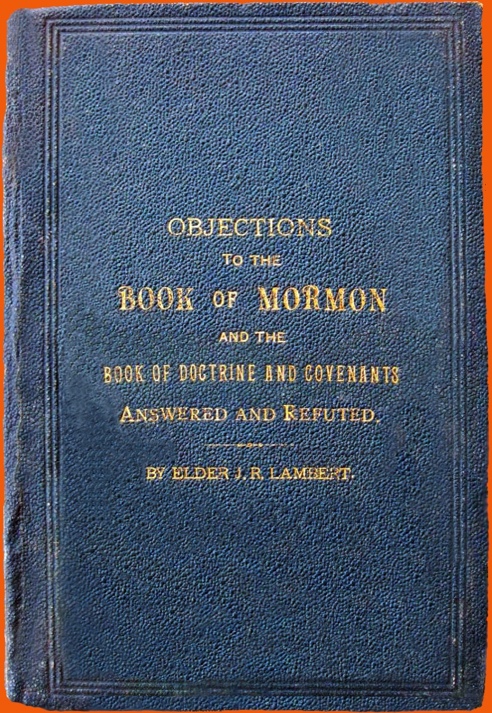
God acts in mysterious ways. This is known to be.
Unknowingly though, one can be subject to, endure and become absorbed by - even over a full lifespan - to one climactic event that on its face can not be wholly perceived at the time of an event’s unfolding, as truly being significant or truly purposeful on a level that is in spirit with God or God's unspoken purpose.
Not often during any man’s journey through what man calls life, of human experience, does one unto himself become wholly part and parcel to the purity, sanctity and most importantly - of divine purpose for and of God, the Lord Savior. Or, for that matter, to also become part and parcel most importantly in divine purpose to God’s people as well, all in one action.
God acts in mysterious ways. Yes, this is known to be.
Yes, it can be one climactic event that on its face can not be wholly perceived at the time of the event’s unfolding, as truly being significant or truly purposeful on a God sphere level of understanding. This is because, not all variables codifying such significance can be properly metered at the time of the event’s unfolding.
The ravages of time brought on by decades that turn into one passing century into another, will, as man’s understanding of all things often becomes more refined, all after the actions of a past event has long occurred, become in retrospect, an event that comes, through its own virtues, to suddenly reveal itself in later times. New truths come forward. Validation is achieved. Confirmation of what was perceived as true, now suddenly becomes, in the physical realm - wholly true - or at least becomes closer to the truth.
The gravity of the event can become elevated with time, and long after those personally involved in the event who actually come to meet God, their maker, upon their death, never come to know the full significance of their past actions while living on Earth.
A perfect example of this is Mormon LDS Church co-founder John Whitmer, who was excommunicated from the church he help found. It was in John Whitmer's father Peter's upper New York State cabin in Fayette on 6 April 1830 that the charter for the Mormon church was signed and sanctified......... all which John Whitmer witnessed in person through his own eyes, as he did the gold plates of Angel Moroni that had been presented to Prophet Joseph Smith.
Past actions tend to become benchmarks in a manner that further guides man in the name of God as man continues in his evolution here on Earth.
Here in this work comprising this, the Mormon Key, this author Richard Warren Lipack shall reveal the late 19th century accomplishment of one great Mormon spirit who lived here on Earth, which as of this writing, is believed by this author to be the written efforts executed in the hand of the Reorganized Church of Jesus Christ of Latter-Day Saints (RLDS Church) Mormon church co-founder Elder Joseph R. Lambert.
Details of this attribution shall be disclosed and unfolded in the course of the next few years on this website via all of the actual work manifested within the journal and to be premiered on MormonKey.com here for the first time worldwide.
The work is drawn from the most remarkable 1870’s private “Scrap - Book” journal that is in fact the literal inspiratonal nucleus for MormonKey.com; attributed at this time to be the work of Elder Joseph R. Lambert.
After the journal's discovery in the early 2000’s, the "Scrap - Book" was immediately found to contain the long considered lost 6 May 1877 dated handwritten letter by Book of Mormon “Eight Witnesses” and first Mormon historian John Whitmer. This letter has come to be found to be the only true hand written Testimony to the Book of Mormon extant executed after the bible's 1830 publication, as will be revealed in more details on these Internet pages.
It is hoped that as this discussion and its revelations are brought forward by this author, documents will concurrently become accessible to this author in order to complete his assessment by paleographic comparative analysis with known exemplars to form more conclusive evaluation of the unsigned "Scrap - Book" that contains the singularly most important evaluation of the Mormon religion from within the religion itself that perhaps will ever come forward.
In the meantime, let us look a little closer at the man who went to his death in 1932 after 87 years on Earth never knowing that he held closest to his heart and spirit the truest essence of the entire Mormon experience.
Elder Joseph R. Lambert with the Reorganized LDS "Counsel of Twelve" - circa 1913
Original copy of book authored by Joseph R. Lambert. Today this book title from 1912 is widely reprinted and distributed worldwide.
REVEALED ABOVE IS ONLY EXTANT SIGNED HANDWRITTEN FULL TESTIMONY BY ANY "WITNESSES" TO THE BOOK OF MORMON PENNED IN INK BY BOOK OF MORMON "EIGHT WITNESSES" JOHN WHITMER, DATED 6 MAY 1877 AND LONG ASSUMED AS LOST. WRITTEN TO MORMON RLDS ELDER JOSEPH R. LAMBERT.
FOUND GLUED IN 1870'S MORMON "SCRAP-BOOK" JOURNAL DISCOVERED IN RECENT TIMES. THE JOURNAL ALSO CONTAINS CYPHER IN THE FORM OF NOW LOST OLD PITMAN SHORTHAND WRITING THAT HAS BEEN TRANSCRIBED IN ENGLISH LONG HAND WRITING OVER A DECADE AGO.
WORK EXECUTED IN OLD PITMAN SHORTHAND CONTAINED IN "SCRAP - BOOK" JOURNAL IS ATTRIBUTED TO JOSEPH R. LAMBERT, TO WHOM THE 6 MAY 1877 JOHN WHITMER TESTIMONY CONTAINED WITHIN IT IS WRITTEN. THE SANCTITY OF THE MORMON FAITH WAS AFFIRMED UPON THE LETTER'S DISCOVERY. THE WORK TRANSCRIBED FROM THIS JOURNAL INTO STANDARD ENGLISH LONG HAND TEXT OVER TEN YEARS AGO AND PROVIDED, QUITE MIRACULOUSLY THE ONLY OPPORTUNITY BY GRAND PROVIDENCE AVAILABLE REVEALS A REMARKABLE STORY AND PROVIDES RARE DRAMATIC INSIGHT INTO THE SENTIMENTS OF A MAJOR FRAGMENT OF THE ORIGINAL MORMONIST EPOCH THAT HAS TO DATE NOT BEEN FULLY TOLD OR EXAMINED BY MORMON SCHOLARS.
LAMBERT, Joseph Richard. (1845-1932) Joseph R. Lambert served as Acting Presiding Patriarch of the RLDS Church from August 12, 1909 to April 20, 1913.
Elder LAMBERT’S 1908 autobiography was published in ”History of The Reorganized Church of Jesus Christ of Latter Day Saints." Vol. III. Chapt. 40. Pp. 692 - 703. Herald Publishing House.

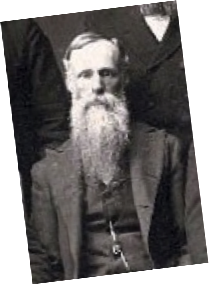
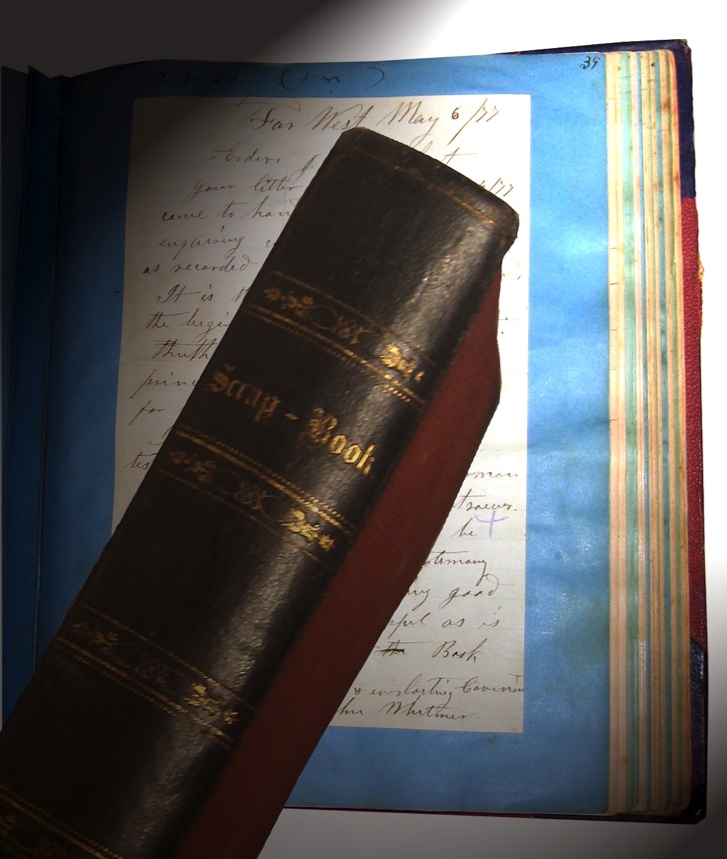
(Courtesy: Private Collection)
"MORMONKEY: The Key to News and History of the Mormon Faith"
